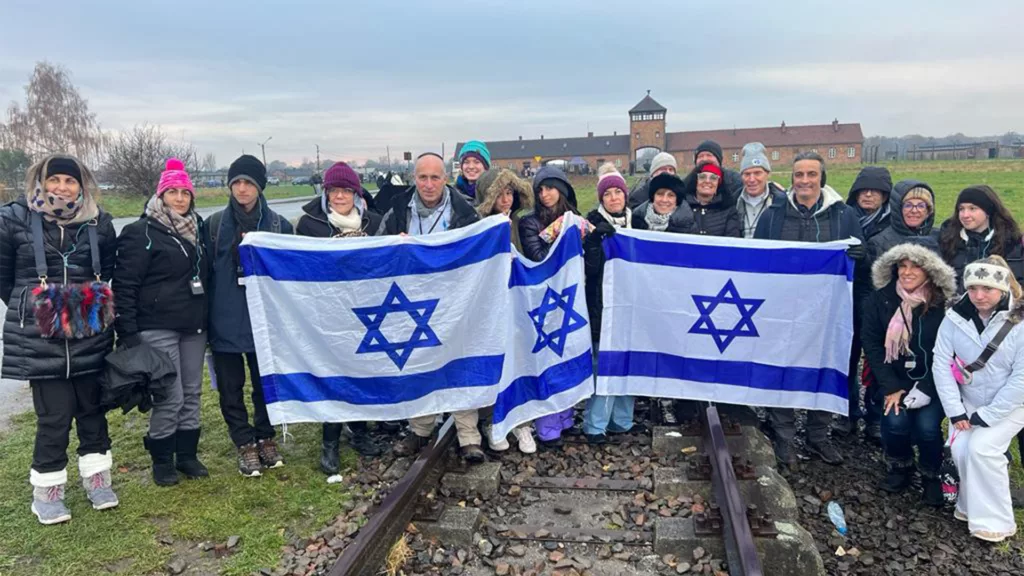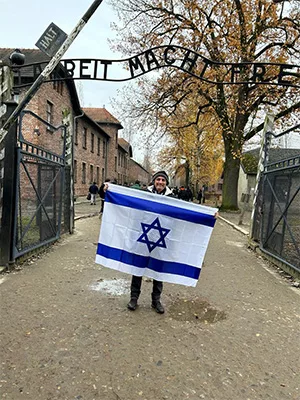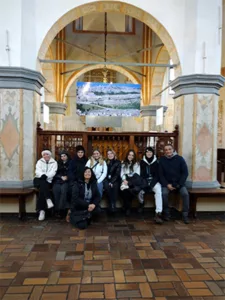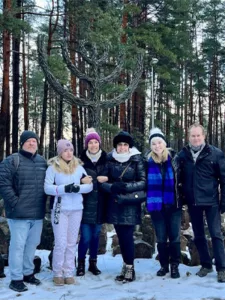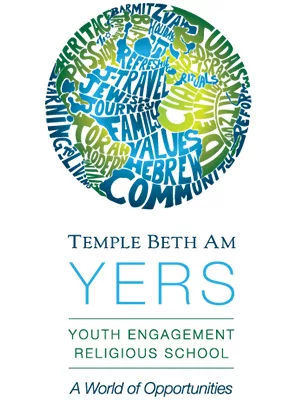An Unforgettable Multigenerational Trip – Poland 2023
Journey of Remembrance: Tracing the Shadows of the Holocaust in Poland during Thanksgiving – A Transformative Experience for Our Temple Beth Am families.
Together We Will Win
Sharone Levi
Over Thanksgiving break, members of our Temple Beth Am community and I visited Poland on a Holocaust and Heritage trip. This was a truly powerful experience that was deeply personal to me. Visiting the concentration camps was an emotional aspect of the trip, yet it was so important. Standing strong in Auschwitz-Birkenau, Treblinka, and Majdanek, our group honored the memory of the six million plus victims. As we know, the Nazis were not successful in their genocide of the Jewish people. This serves as a strong affirmation. Unfortunately, we are now seeing a similar act of hate repeating itself with the horrific events that occurred on October 7 in Israel.
It was beautiful to see multiple generations of temple congregants come together. We learned about the origins of antisemitism, which can be traced back to the 1600s. One of the most moving parts of the trip was visiting the vanished Tykocin Jewish community. In 1941, the Germans took over and eliminated all of Tykocin’s Jews in the nearby forest of Łopuchowo. Gone, but not forgotten.
I want to give a big shout-out to Tamara Donnefeld. Sometimes, after working with someone for so long, it’s somehow easy to forget how good they are at what they do. Tamara was absolutely outstanding with the messaging, education, and knowledge. By the same token, I also want to thank Mel Mann for his support and logistical help during the trip.
I believe that every member of Temple Beth Am should be offered the opportunity to experience firsthand the transformative power of this journey. To make this accessible for all, I am establishing the “Holocaust and Heritage Fund,” which will subsidize costs for future trips. This initiative will enable every member to appreciate the significance of this powerful, meaningful, and spiritually enriching Holocaust and Heritage trip.
Thank you to everyone who participated in the trip to Poland. This journey has meant so much to me, and I know it profoundly impacted us all. Our time in Poland and the experiences we had really drove home the importance of remembering the past and continuing to fight against hate and prejudice.
Am Yisrael Chai
As they say in Israel:
Together We Will Win
If Trees Could Talk
Cameron Gussin
In the middle of the Lopuchowo forest in northeastern Poland, I listened to the chilling story of the extermination of an entire small town called Tykocin. Two thousand children, mothers, fathers, and elders all marched to their deaths after the invasion by the Nazis in August of 1941. No one survived to tell their story, but the trees watched it all: the crying, shock, despair, torture, and realization of the end of so many beautiful lives. I walked alongside my mother and grandmother in the subzero weather, impossibly trying to imagine children walking with their mothers, knowing death was inevitable. The horror is inconceivable; and yet, it happened.
I do not recall the first time I learned about the Holocaust. Rather, it has always been embedded in my soul through my family’s history. I hear stories about my resilient greatgrandma – the woman whose name I was given, and whose eyes and laugh are now mine. She miraculously survived the Holocaust and lived to share her story through generations, despite unimaginable grief, serving as a reminder to never forget the past.
While it may be cliche to say we must learn history so it doesn’t repeat itself, truer words have never been uttered. Primo Levi wrote, “It happened, therefore it can happen again.” As a student of history, it is my responsibility to ensure this doesn’t happen. I spent a week in Poland retracing historical events and walking in my namesake’s footsteps to gain a greater understanding of the importance of studying history. Learning history allows society to grow from its mistakes and to develop into a more understanding, compassionate world. Without this knowledge, the same tragedies that occurred in the past may continue to reoccur. Looking back for a week and visiting places “frozen” in time reaffirmed the importance of learning history so that it may never be forgotten.
However, I am dismayed by the horrors of what is being repeated 80 years later. Today, the world struggles to find peace, constantly stuck in a place where no one seems able to find a solution. I want to process the information I’ll learn to utilize it in real life, to contribute to a moral and thriving community that seeks to never repeat the disasters of the past. Through a dedication to continue learning diverse perspectives of history, I aspire to ignite change that encourages people to become active voices who advocate to improve society. We must remember our history, the storybook of the world, the timeline of our past, and all the events that led to this moment. This proves the only way to learn and to grow.
I carry on the name of a Holocaust survivor, bearing the responsibility to remind the world of the past and to work to ensure society never repeats its atrocities. The trees may not be able to talk and share their history, but we can and we must.
A Personal Story of The Holocaust
Edith Osman
This Thanksgiving was like no other! After all, three generations of my family joined Beth Am’s first intergenerational Holocaust study trip to Poland during Thanksgiving week. The six of us planned a separate visit to Riga, Latvia, my mother’s hometown, at the end of the group trip.
Antisemitism was a recurring theme throughout my childhood. As newlyweds, my parents had escaped from Latvia just one year before the Nazis brutally murdered their families. For their entire lives, my parents struggled with the knowledge that they were the sole survivors of their families. We grew up understanding the fears and warnings about a recurrence of antisemitism.
As an adult, I have become obsessed with the Holocaust and how the world stood by and let it happen. That is perhaps the reason I agreed to chair the unBIASed antisemitism initiative at Temple Beth Am.
An intimate group of 21 brave souls participated in the journey to Poland, each with their own connection to antisemitism. We toured the villages in which Jewish people lived, the places they hid, the labor camps, the killing fields, and the extermination camps. We coupled these visits with readings from survivors, bringing the past alive. One heart-wrenching story after another, one day after another; three generations were all trying to understand how this could have happened.
My family flew to Riga on Thanksgiving morning. Sub-freezing temperatures and snow greeted us in Riga. There was no Thanksgiving dinner waiting for us, but Riga is a beautiful city, and it turned out to be the key to the information I have long sought.
While antisemitism was present as my mother grew up, there was a coexistence of sorts between Jews and non-Jews. My Jewish family was cultured and educated, and from what I could see, they lived lives very much like we live today. Yet, as soon as the Germans occupied Latvia, antisemitism turned into a cruel and barbaric vehicle for torture and murder. In Riga, it started with setting the main synagogue of the city on re with 300 people inside.
I was searching for answers about what had actually happened to my family. In my earlier trips to Yad Vashem and Birkenau, I searched for my family’s names in the hall of names to no avail. But nothing prepared me for what I would find in Riga. At the Museum of the Riga Ghetto, I found a dozen names of both my mother’s and my father’s family on their wall of names. In addition, I hired a genealogist who found some information and took us to the archives on Friday morning. There, I reviewed family records dating back to 1829. There were pictures of people I never knew, along with names of the cities in which they were born and lived. There were visa and passport applications that wove together a story of their lives.
My mother seemed to know that her mother and 13-year-old sister were part of the first round-up of Jews in November 1941 who were marched out to the Rumbali forest and shot into mass graves. But she was never certain if her father was killed at Rumbali; in fact, she had heard stories that he survived much of the war. We finally learned that he was kept alive for another three years because he was of use to the Nazis, only to be exterminated at Dachau four months before the camp was liberated. We visited and said Kaddish at the snow-covered memorial at the killing fields at Rumbali and the graves of my great-grandparents in the old Jewish cemetery in Riga.
I left Riga with a great deal of sadness but also a feeling of closure and finality. I am so grateful to Beth Am for providing me with this experience and giving me even more inspiration to fuel the unBIASed fight against antisemitism.
Please click below for highlights.
Interested in Joining the 2024 Poland Trip?
Registration opens on January 15.
Informational Zoom Meeting January 10 at 6 PM.
For details and zoom link, please email Lisa Reichert at [email protected]
